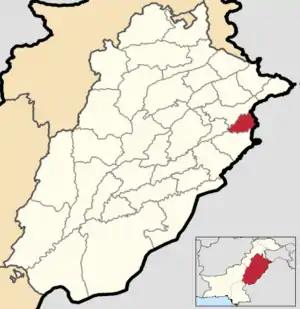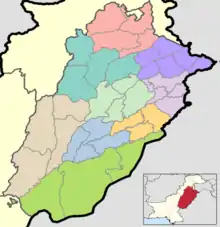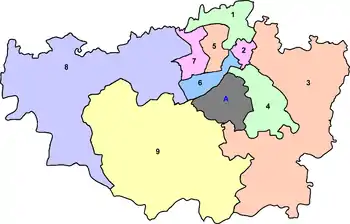Lahore District
Lahore District (Punjabi, Urdu: ضلع لاہور) is a district that is a part of the Majha region in the Punjab province of Pakistan, mainly consisting of the city of Lahore. The total area is 1,772 square kilometres (684 sq mi).
Lahore District
ضلع لاہور | |
|---|---|
 Map of Lahore District highlighted within Punjab Province | |
| Country | |
| Province | |
| Named for | Lahore |
| Headquarters | Lahore |
| Area | |
| • Total | 1,772 km2 (684 sq mi) |
| Elevation | 216 m (709 ft) |
| Population (2017)[1] | |
| • Total | 11,126,285 |
| • Density | 6,300/km2 (16,000/sq mi) |
| Time zone | UTC+5 (PST) |
| National Assembly Seats (2018) | Total (14)
|
| Punjab Assembly Seats (2018) | Total (30)
|
Administration
Under the Local Government Act of Punjab, 2013, Lahore District has been declared a Metropolitan Area and divided into nine zones.[2]
Demography
According to the 1998 census, the district's population was 6,320,000, 82% of which was urban.[3]:45 Punjabi is the first language[4] of 86% of the population, while Urdu and Pashto account for 10% and 2% respectively.[3]:50 The 2017 Census revealed a population of over eleven million people.
Eastern Parts of Lahore Tehsil bordering the Amritsar District, were before 1947 Partition, Sikh Jatt Majority. The Sikh Jatts were the Leading Zaildars of Padhana, Thehpura, Qila Jivan, Manhala, Ghawindi, Bhasin.
Education
According to Pakistan District Education Rankings, a report by Alif Ailaan, Lahore is ranked nationally at 32 with a score of 69.2 and learning score of 53.93. Lahore ranks nationally at number 1 in terms of readiness score, with a score of 93.51. According to PEC assessments, Lahore ranks last out of all districts of Punjab in both class 5 and class 8.
Science labs in schools are either not available or have inadequate instruments which also affects quality. The school infrastructure score of Lahore is 91.32, ranking it 29th nationally. Still few schools in a major district like Lahore have open air or dangerous classrooms.
Issues mainly reported in TaleemDo! app[5] from Lahore are that students want to study in private schools, as they are better than government schools but can not afford the fee. A communication gap between the teachers and the students was also reported and a few reported some facilities problems in their school.
See also
References
- "DISTRICT WISE CENSUS RESULTS CENSUS 2017" (PDF). www.pbscensus.gov.pk. Archived from the original (PDF) on 29 August 2017. Retrieved 3 September 2017.
- https://lgcd.punjab.gov.pk/system/files/MCLZones.pdf
- 1998 District Census report of Lahore. Census publication. 125. Islamabad: Population Census Organization, Statistics Division, Government of Pakistan. 2000.
- "Mother tongue": defined as the language of communication between parents and children, and recorded of each individual.
- "Archived copy". Archived from the original on 3 August 2018. Retrieved 13 August 2018.CS1 maint: archived copy as title (link)


